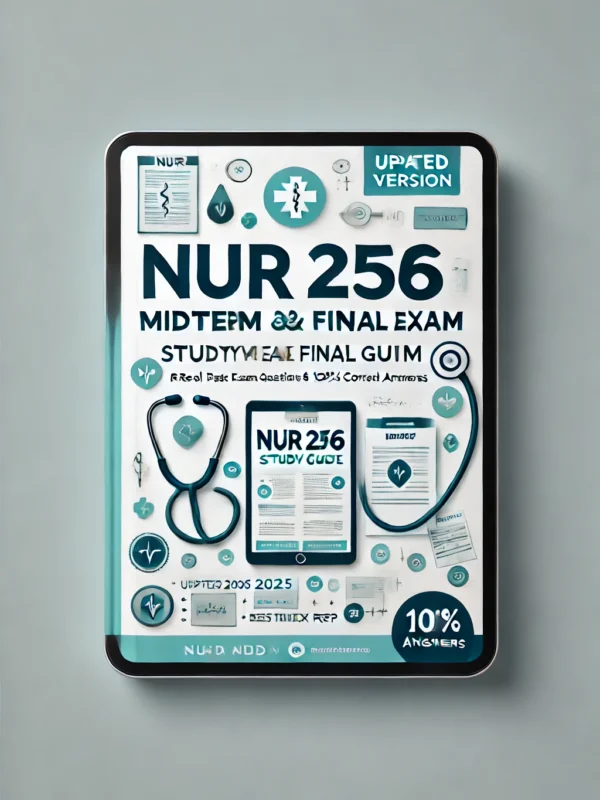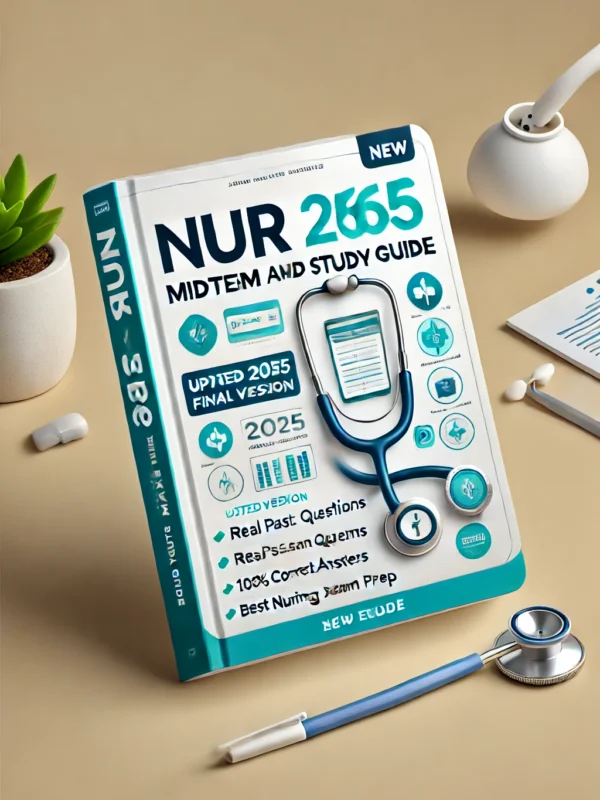Prepare to excel in your nursing education with the NURS 611 Advanced Pathophysiology Exam 1 Study Guide 2024, a meticulously crafted resource designed to help you master the complexities of pathophysiology and ace your exam with confidence. This comprehensive study guide is tailored specifically for the 2024 NURS 611 Exam 1, covering all critical topics such as cellular function, inflammation, immune responses, genetic disorders, and organ system pathophysiology. Featuring verified questions and detailed answers, each section provides in-depth explanations to ensure you not only memorize but truly understand the underlying mechanisms of disease processes. Updated to reflect the latest 2024 exam standards, this guide offers a structured approach to learning, making it ideal for nursing students aiming to build a strong foundation in advanced pathophysiology. Whether you’re preparing for your exam or seeking to deepen your clinical knowledge, this study guide is your key to success, helping you achieve top grades and advance your nursing career. Don’t leave your performance to chance—equip yourself with the best tool to conquer NURS 611 Exam 1!
Preview
1. What is the main ion found in extracellular fluid (ECF)?
A) Potassium
B) Calcium
C) Sodium
D) Magnesium
Answer: C) Sodium
Rationale: Sodium is the primary cation in ECF and is crucial for maintaining fluid balance and
nerve conduction.
2. Which ion is primarily found in intracellular fluid (ICF)?
A) Sodium
B) Calcium
C) Potassium
D) Chloride
Answer: C) Potassium
Rationale: Potassium is the main cation in ICF, essential for cell function and maintaining
membrane potential.
3. What organelle is responsible for producing ATP?
A) Ribosome
B) Golgi Apparatus
C) Lysosome
D) Mitochondria
Answer: D) Mitochondria
Rationale: Mitochondria are known as the powerhouse of the cell, generating ATP through
oxidative phosphorylation.
4. What do ribosomes do?
A) Synthesize ATP
B) Degrade waste
C) Synthesize proteins
D) Package and distribute proteins
Answer: C) Synthesize proteins
Rationale: Ribosomes are the site of protein synthesis, translating mRNA into polypeptides.
5. What is the function of lysosomes?
A) Protein synthesis
B) ATP production
C) Waste degradation and recycling
D) Lipid synthesis
Answer: C) Waste degradation and recycling
Rationale: Lysosomes contain enzymes that break down waste materials and cellular debris.
A) Potassium
B) Calcium
C) Sodium
D) Magnesium
Answer: C) Sodium
Rationale: Sodium is the primary cation in ECF and is crucial for maintaining fluid balance and
nerve conduction.
2. Which ion is primarily found in intracellular fluid (ICF)?
A) Sodium
B) Calcium
C) Potassium
D) Chloride
Answer: C) Potassium
Rationale: Potassium is the main cation in ICF, essential for cell function and maintaining
membrane potential.
3. What organelle is responsible for producing ATP?
A) Ribosome
B) Golgi Apparatus
C) Lysosome
D) Mitochondria
Answer: D) Mitochondria
Rationale: Mitochondria are known as the powerhouse of the cell, generating ATP through
oxidative phosphorylation.
4. What do ribosomes do?
A) Synthesize ATP
B) Degrade waste
C) Synthesize proteins
D) Package and distribute proteins
Answer: C) Synthesize proteins
Rationale: Ribosomes are the site of protein synthesis, translating mRNA into polypeptides.
5. What is the function of lysosomes?
A) Protein synthesis
B) ATP production
C) Waste degradation and recycling
D) Lipid synthesis
Answer: C) Waste degradation and recycling
Rationale: Lysosomes contain enzymes that break down waste materials and cellular debris.











Reviews
There are no reviews yet.